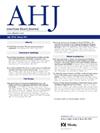Impact of moderate or severe mitral and tricuspid valves regurgitation after transcatheter aortic valve replacement
IF 3.7
2区 医学
Q1 CARDIAC & CARDIOVASCULAR SYSTEMS
引用次数: 0
Abstract
Background
Tricuspid regurgitation (TR) and mitral regurgitation (MR) are common valvular conditions encountered in patients undergoing transcatheter aortic valve replacement (TAVR). This retrospective study investigates the impact of moderate or severe TR and MR on all-cause mortality in 1-year post-TAVR patients.
Methods
Consecutive patients who underwent TAVR at the 3 academic tertiary care centers in our health system between 2012 and 2018 were identified. Patients were stratified into 2 groups based on valvular regurgitation severity: moderate/severe MR vs no/mild MR, and moderate/severe TR vs no/mild TR. Primary outcome was all-cause mortality at 1-year and 5-year follow up, and secondary outcome was in-hospital death. Logistic regression analysis was conducted to assess the relationship between moderate/severe MR or TR and all-cause mortality at 1-year and 5-year follow-up.
Results
We included a total of 1,071 patients who underwent TAVR with mean age 80.9 ± 8.6 years, 97% white, and 58.3% males. Moderate or severe MR group included 52 (4.88%) patients while mild or no MR group included 1,015 (95.12%) patients. There was no significant difference between both groups in TAVR procedure success rate (100% vs 97.83%, P = .283), in-hospital mortality (0 vs 1.08%, P = .450), or mortality at 1-year follow up (15.38% vs 14.09%, P = .794). At 5-year follow up, moderate/severe MR group had higher mortality (61.4% vs 49.5%, P = .046). In multivariable logistic regression analysis, moderate or severe MR did not show significant correlation with all-cause mortality at 1-year and 5-year follow up. Moderate or severe TR group included 86 (8.03%) patients while mild or no TR group included 985 (91.97%) patients. There was no difference between both groups in TAVR procedure success (98.8% vs 97.9%, P = .54) or in-hospital mortality (0% vs 1.1%, P = .33). At 1-year follow up, patients with moderate or severe TR had higher mortality (26.7% vs 13.2%, P = .001) compared to patients with mild or no TR. Same finding was noted with extended follow up at 5-years (68.3% vs 48.7%, P < .001). In multivariable cox regression analysis, moderate/severe TR was associated with higher all-cause mortality at 1-year (OR 1.94, 95% CI [01.09, 3.44], P = .023) and at 5-year (OR 1.46, 95% CI [1.092, 1.952], P = .011) follow up. Patients with combined moderate/severe MR and TR have even higher mortality compared to either moderate/severe valve regurgitation alone or mild/no valve regurgitation at 5-year follow up.
Conclusion
At long term follow up, moderate/severe TR, but not MR, is associated with higher mortality in patients underwent TAVR. Combined moderate/severe TR and MR had even worse mortality. Careful assessment of multivalvular heart disease prior to the procedure is warranted.
经导管主动脉瓣置换术后中度或严重二尖瓣和三尖瓣反流的影响。
背景:三尖瓣反流(TR)和二尖瓣反流(MR)是经导管主动脉瓣置换术(TAVR)患者常见的瓣膜疾病。这项回顾性研究调查了中度或重度TR和MR对TAVR术后一年患者全因死亡率的影响:确定了 2012 年至 2018 年期间在我们医疗系统的 3 个学术三级护理中心接受 TAVR 的连续患者。根据瓣膜返流严重程度将患者分为两组:中度/重度 MR 与无/轻度 MR,以及中度/重度 TR 与无/轻度 TR。主要结果是随访1年和5年时的全因死亡率,次要结果是院内死亡。我们进行了逻辑回归分析,以评估中度/重度MR或TR与随访1年和5年的全因死亡率之间的关系:我们共纳入了 1071 名接受 TAVR 的患者,他们的平均年龄为 80.9 ± 8.6 岁,97% 为白人,58.3% 为男性。中度或重度 MR 组包括 52 名患者(4.88%),而轻度或无 MR 组包括 1,015 名患者(95.12%)。两组患者在TAVR手术成功率(100% vs. 97.83%,P=0.283)、院内死亡率(0 vs. 1.08%,P=0.450)或1年随访死亡率(15.38% vs. 14.09%,P=0.794)方面无明显差异。在 5 年随访中,中度/重度 MR 组死亡率更高(61.4% 对 49.5%,P=0.046)。在多变量逻辑回归分析中,中度或重度MR与随访1年和5年的全因死亡率无显著相关性。中度或重度TR组包括86名患者(8.03%),而轻度或无TR组包括985名患者(91.97%)。两组在TAVR手术成功率(98.8% vs. 97.9%,P=0.54)和院内死亡率(0% vs. 1.1%,P=0.33)方面没有差异。在1年的随访中,中度或重度TR患者的死亡率(26.7% vs. 13.2%,p=0.001)高于轻度或无TR患者。在延长随访 5 年后也发现了同样的情况(68.3% 对 48.7%,P=0.001):在长期随访中,中度/重度TR与接受TAVR的患者死亡率升高有关,但与MR无关。合并中度/重度TR和MR的死亡率更低。手术前应仔细评估多瓣膜心脏病。
本文章由计算机程序翻译,如有差异,请以英文原文为准。
求助全文
约1分钟内获得全文
求助全文
来源期刊

American heart journal
医学-心血管系统
CiteScore
8.20
自引率
2.10%
发文量
214
审稿时长
38 days
期刊介绍:
The American Heart Journal will consider for publication suitable articles on topics pertaining to the broad discipline of cardiovascular disease. Our goal is to provide the reader primary investigation, scholarly review, and opinion concerning the practice of cardiovascular medicine. We especially encourage submission of 3 types of reports that are not frequently seen in cardiovascular journals: negative clinical studies, reports on study designs, and studies involving the organization of medical care. The Journal does not accept individual case reports or original articles involving bench laboratory or animal research.
 求助内容:
求助内容: 应助结果提醒方式:
应助结果提醒方式:


